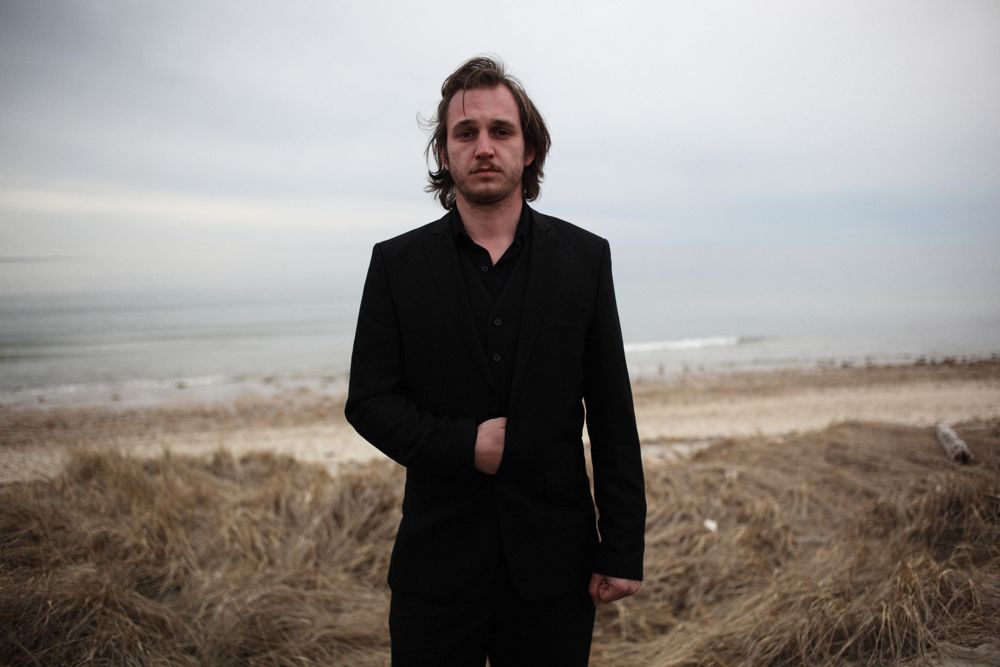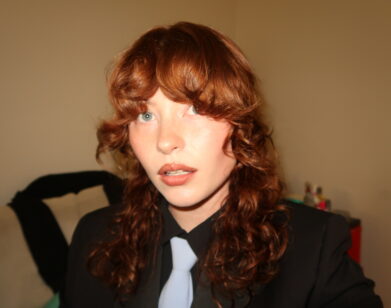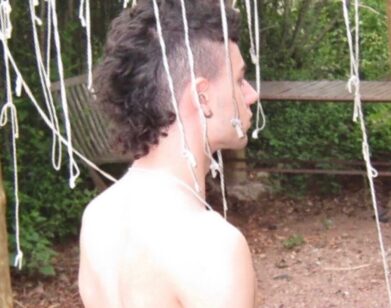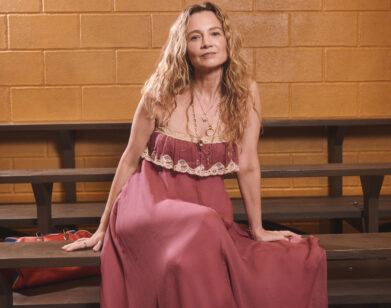Willy Mason’s Got Gold

ABOVE: WILLY MASON. PHOTO COURTESY OF MIKAEL GREGORSKY.
Willy Mason is an easy character to romanticize. The direct descendent of philosopher William James (the brother of Henry James) and the son of two folk singers, Mason was only 19 when he released his first album, 2004’s Where the Human’s Eat. His single “Oxygen,” an unpretentious anti-materialism ode to “the forgotten America,” announced him as a fresh face of folk and peaked at Number 23 on the UK charts. Three years later, he released If the Ocean Gets Rough. Then, after years of touring, Mason took a break and returned to his hometown, Martha’s Vineyard.
Now, thankfully, Mason is back with a new album Carry On and a new place in the folk scene next to his tour mates Mumford & Sons and Edward Sharpe & the Magnetic Zeroes. “I was not thinking in terms of an album when I started writing,” Mason explains over the phone. “I was just writing out of habit.”
EMMA BROWN: One of my favorites songs on your new record is “If It’s the End.” I like the chorus, “If it’s the end it’s not the only end”—can you tell me a little bit about it?
WILLY MASON: I wrote it about a bunch of things all at once. There was a bunch of changes going on, and most of them for the worst, but I was kind of hoping that in the end, they’d be for the best.
BROWN: And were they?
MASON: I’m still waiting to see on some of them, but I think so. I’m feeling much better about it now.
BROWN: Do you generally write songs from your own perspective, or do your prefer to write in character?
MASON: Writing from a character is really fun—sometimes you can be more honest through somebody else’s perspective, but this album is mostly personal songs just ’cause I needed to write them.
BROWN: What do you see as the point of your music?
MASON: The point of my music is to make people feel good. When I do it right, it makes me feel good too.
BROWN: I know that this album came out in England last year. Do you normally release music in England first?
MASON: It’s changed from record to record. But this one, I’d been away for so long, I was kind of starting from scratch finding distribution and everything. I had more contacts overseas than I did here from the last album, so it was just easier to set things up. I tried to get them out at the same time but it just takes too long to figure out what to do in America.
BROWN: But you’ve already toured the album?
MASON: I’ve been touring it. I did one tour of the US back in March. Since then, I’ve pretty much been either in the UK or Europe. I went to Australia a couple of times. I’ve been touring straight since Christmas, just not that much in the US.
BROWN: Your Australian tour was with Mumford & Sons—how was that?
MASON: It’s fun to tour with a band that’s as successful as Mumford & Sons. Australia was amazing; I saw parts of that country that I don’t think I’ll ever get to see on another tour. They’re so popular over there we got to go to towns that a lot of bands never get to. They’re interested in playing in places that are off the beaten path and they can afford to do so.
BROWN: Is your audience a completely new audience, or are there people who have been fans of you since the beginning?
MASON: I think it’s a big mix at this point. I’m definitely seeing more and more new people at shows, which is exciting. It’s nice for me, because it’s a fresh start. I don’t feel as obligated to play old favorite songs—it feels like I’m free to try new things because I’m meeting people for the first time. But there’s a lot of people who are showing up and they know all the words to the first album and they’re requesting songs from the second album. I was not counting on anything when I came back, and for the most part it’s felt like the wind has been at my back.
BROWN: Are people more receptive in England?
MASON: On the first two albums, there was a lot more awareness than in the States. I had really strong support from a lot of mainstream radio DJs over there. I was more part of the mainstream culture over there.
BROWN: I didn’t realize how young you were when you released your first EP.
MASON: I think I was 17, maybe 18.
BROWN: Do you remember the first song you ever wrote?
MASON: [laughs] I remember part of it. I was big into power chords in those days—I don’t think I really knew what a power chord was, but I saw it in a guitar magazine and I liked the sound of it, so I tried to work it into my repertoire.
BROWN: A lot of the musicians I talk to who started out as teenagers get a little embarrassed about their early music—they don’t feel a connection to it anymore. Is that how you feel about your first EP?
MASON: No, actually. The stuff that I wrote before that, when I was in bands, wouldn’t really fit with my set. But I still play all of those songs. Well, almost all of them. I still really like playing them; they take on different meanings as time goes by.
BROWN: When did you pick up your first instrument?
MASON: Both of my parents are musicians and songwriters and guitar players, but the first instrument I picked up was for school. There was a string program, so I picked up the cello. I play very rarely now. I played the cello on my first record, but it’s a very large and fragile instrument, so it’s hard to keep one around.
BROWN: You should go back to a quarter-sized cello!
MASON: I could go back to a quarter-sized, that’s a good idea. That’d be nice.
BROWN: Was it more intimidating telling your parents that you wanted to be a musician because they are musicians themselves? Or do you think that made it easier?
MASON: I never really decided that I wanted to do music. I always played; there was always music around the house. My parents always played music. Then I started getting gigs—I started getting asked to do gigs and I kept saying “yes.” So that conversation never really happened. There’ve been plenty of times since I started when people have asked me if it’s really what I want to be doing, and there’ve definitely been times when I wasn’t really sure. It took taking a couple of years off the road to record this album to really get clear in my head why I was doing music and what I wanted to do it for. Since then, it’s been easy.
BROWN: What did you doing your time off? Did you take up an exciting hobby—crochet, for example?
MASON: I didn’t take up crochet, but I did get into some other stuff. I got into building things—mostly ‘cause when I first got home I was kind of living on the porch for a while, there wasn’t really room in the house, so I took up building and I built myself a shack in the back corner. I really enjoyed it, so I kept trying to learn more about how the physical world works. I also just got into studying folk music.
BROWN: Is there something your particularly proud of having built?
MASON: Yeah. My dad had a stroke a couple of years ago and I built a really nice banister for the front steps of the house. It’s not particularly fancy, but it’s very sturdy, and every time that he walks up it I feel proud.
BROWN: What are you listening to at the moment?
MASON: Right now, my favorite record is Almost Home by Ralph Stanley. I listen to that while I’m on tour and when I’m shaving in the morning, too. Another one is by Alan Lomax, I’ll Meet You On That Other Shore. It’s a compilation; a set of traveling archivists took a bunch of trips and this album is from a trip called the “Southern Journey,” where he went to the American South—just a bunch of small towns, rural areas—and asked people to sing. There are some amazing tracks on there
BROWN: What do you mean by the lyrics “I’ve got gold beneath the ground?”
MASON: I wrote that one when I was kind of at a loss. I was sort of stranded and I didn’t have a car, I didn’t have anybody, but I had songs and other people liked the songs, so I was trying to reassure myself, I guess, that things were going to be alright over time. I think I might have been partially inspired by the musical that my dad was writing about gold and silver mining—he was always going on about that.
BROWN: Do you consider yourself successful?
MASON: No, not quite yet. I’m cautiously optimistic. I think I’m getting somewhere, I don’t know where that is yet.
BROWN: I heard that you are related to Henry and William James? Did you write every “my family” paper on them in elementary school?
MASON: I don’t think I even became very aware of them until high school, reading their books, and then my mom said, “Oh, that’s your great-great-great grandfather” or whatever. But I do a feel connection to them, though.
BROWN: What’s your favorite Henry James novel?
MASON: It’s been a while since I’ve read any, but I like The Americans.
CARRY ON IS OUT NOW AND WILLY MASON IS CURRENTLY TOURING THROUGHOUT NORTH AMERICA . FOR MORE INFORMATION, VISIT MASON’S WEBSITE.






